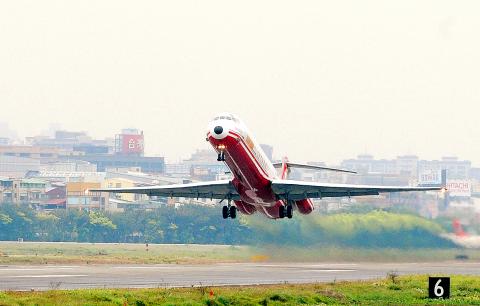Far Eastern Air Transport (FAT) resumed flight services yesterday after being grounded for two years because of financial problems.
The first flight leaving for Kinmen took off from Taipei International Airport (Songshan airport) at 9:30am.
FAT president Chang Kang-wei (張綱維) said at an inauguration ceremony that the airline would initially offer two daily flights between Taipei and Kaohsiung.

Photo: CNA
He said the company was planning to expand its flight services to Makong (馬公) and Kaohsiung and resume international flight services to Angkor Wat in Cambodia and to Palau.
Chang said the Civil Aeronautics Administration (CAA) was planning to re-arrange cross-straight flight services either next month or in June, and FAT would be able to reclaim the 15 cross-strait flights previously reserved for the company before its services were suspended.
Those 15 cross-strait flights are currently shared equally by five other carriers — China Airlines, EVA Air, Uni Air, Mandarin Airlines and TransAsia Airways.
“The day we launch cross-strait flight services is the day we become profitable,” Chang said.
The CAA suspended FAT’s operations in 2008 because of financial problems and the airline’s management has changed several times since then.
The company filed a financial restructuring plan with the Taipei District Court, which approved the company’s plan in 2009.
Chang said many had doubted that the company would be able to start operations again.
“The CAA used the highest standards to examine our plan to resume flights and we also demanded the highest standards of ourselves,” Chang said, adding that the company would undertake quality maintenance and provide new services.
Chang, a property developer who took over FAT in July 2009, said the airline was funded entirely by his personal investment.
He added that the number of the staff had also grown from 40 to 500 under his leadership.
The company owns 10 aircraft, three of which have passed the CAA’s air worthiness test.

Taiwan has received more than US$70 million in royalties as of the end of last year from developing the F-16V jet as countries worldwide purchase or upgrade to this popular model, government and military officials said on Saturday. Taiwan funded the development of the F-16V jet and ended up the sole investor as other countries withdrew from the program. Now the F-16V is increasingly popular and countries must pay Taiwan a percentage in royalties when they purchase new F-16V aircraft or upgrade older F-16 models. The next five years are expected to be the peak for these royalties, with Taiwan potentially earning

STAY IN YOUR LANE: As the US and Israel attack Iran, the ministry has warned China not to overstep by including Taiwanese citizens in its evacuation orders The Ministry of Foreign Affairs (MOFA) yesterday rebuked a statement by China’s embassy in Israel that it would evacuate Taiwanese holders of Chinese travel documents from Israel amid the latter’s escalating conflict with Iran. Tensions have risen across the Middle East in the wake of US and Israeli airstrikes on Iran beginning Saturday. China subsequently issued an evacuation notice for its citizens. In a news release, the Chinese embassy in Israel said holders of “Taiwan compatriot permits (台胞證)” issued to Taiwanese nationals by Chinese authorities for travel to China — could register for evacuation to Egypt. In Taipei, the ministry yesterday said Taiwan

Taiwan is awaiting official notification from the US regarding the status of the Agreement on Reciprocal Trade (ART) after the US Supreme Court ruled US President Donald Trump's global tariffs unconstitutional. Speaking to reporters before a legislative hearing today, Premier Cho Jung-tai (卓榮泰) said that Taiwan's negotiation team remains focused on ensuring that the bilateral trade deal remains intact despite the legal challenge to Trump's tariff policy. "The US has pledged to notify its trade partners once the subsequent administrative and legal processes are finalized, and that certainly includes Taiwan," Cho said when asked about opposition parties’ doubts that the ART was

If China chose to invade Taiwan tomorrow, it would only have to sever three undersea fiber-optic cable clusters to cause a data blackout, Jason Hsu (許毓仁), a senior fellow at the Hudson Institute and former Chinese Nationalist Party (KMT) legislator, told a US security panel yesterday. In a Taiwan contingency, cable disruption would be one of the earliest preinvasion actions and the signal that escalation had begun, he said, adding that Taiwan’s current cable repair capabilities are insufficient. The US-China Economic and Security Review Commission (USCC) yesterday held a hearing on US-China Competition Under the Sea, with Hsu speaking on